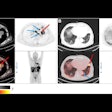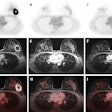Lutetium vipivotide tetraxetan (lutetium-177 [Lu-177] prostate-specific membrane antigen [PSMA]-617) -- sold under the brand name Pluvicto -- appears to perform as effectively in cancer patients in “real-world” settings as it did in clinical trials prior to its regulatory approval.
A group led by Dr. Andrei Gafita, from the Johns Hopkins Theranostics Center in Baltimore, Maryland, U.S., also found that an AI algorithm called SelectPSMA may help determine how patients respond to the radiopharmaceutical.
“[SelectPSMA] was the most accurate screening test to identify patients with the lowest likelihood of achieving at least a 50% [prostate-specific antigen] decline and patients with the highest risk of progression,” Gafita and colleagues explained. Their findings were published on 19 September in the Journal of Nuclear Medicine.
The U.S. Food and Drug Administration approved Pluvicto for patients with PSMA-positive metastatic castration-resistant prostate cancer in March 2022. It was approved by the European Medicines Agency in December 2022 (see https://www.ema.europa.eu/en/medicines/human/EPAR/pluvicto). However, current data on its efficacy and toxicity profile are scarce.
Thus, the primary objective of this study was to evaluate how Pluvicto performed in patients treated at Johns Hopkins Hospital between December 2021 and January 2024. The researchers enrolled 76 patients who met the same imaging criteria for treatment as used in preapproval clinical trials.
Response outcome was defined as a decline in prostate-specific antigen (PSA) of 50% or more, PSA progression-free survival (PFS), and overall survival (OS). The researchers also evaluated toxicity, as well as analyzed baseline PSMA PET/CT images using SelectPSMA to predict treatment outcomes.
According to the study results, 30 out of 74 (41%) patients showed a PSA response. Median PSA PFS was 4.1 months and the median OS was 13.7 months. Anemia of grade 3 or greater was seen in nine (12%) patients, thrombocytopenia in three (4%), and neutropenia in one (1%), the researchers noted.
“Lu-177 PSMA-617 offered in a real-world setting after regulatory approval in the United States demonstrated antitumor activity and a favorable toxicity profile,” the group wrote.
In addition, 18 of 71 patients (25%) classified by the SelectPSMA AI algorithm as nonresponders had significantly lower rates of PSA response than patients classified as likely responders (6% vs. 51%; p < 0.001), a shorter PSA PFS (median 1.3 vs. 6.3 months; p < 0.001), and a shorter OS (median 6.3 vs. 14.5 months; p = 0.046).
“Artificial intelligence-based analysis of baseline PSMA PET/CT images may improve patient selection,” the authors added.
The authors wrote that to the best of their knowledge, this study was the first since the regulatory approval of Pluvicto to evaluate the drug's efficacy and toxicity in a U.S. treatment center. The analysis found outcomes similar to real-world data reported in Germany before drug approval, they noted.
Ultimately, more such studies are needed to develop advanced strategies to identify nonresponders using baseline tumor and patient characteristics and to improve patient selection for PSMA-targeted therapies, they wrote.
“Validation of these findings in larger, multicentric prospective studies is warranted,” the researchers concluded.
The full study is available here.



















